|
|
|
Sort Order |
|
|
|
Items / Page
|
|
|
|
|
|
|
| Srl | Item |
| 1 |
ID:
037156
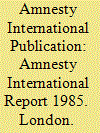

|
|
|
|
|
| Publication |
London, Amnesty International Publication, 1985.
|
| Description |
viii, 359p.
|
| Standard Number |
0862100879
|
|
|
|
|
|
|
|
|
|
|
|
Copies: C:1/I:0,R:0,Q:0
Circulation
| Accession# | Call# | Current Location | Status | Policy | Location |
| 025883 | 364.65/AMN 025883 | Main | On Shelf | General | |
|
|
|
|
| 2 |
ID:
037157
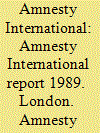

|
|
|
|
|
| Publication |
London, Amnesty International Publication, 1989.
|
| Description |
310p.
|
| Standard Number |
0862101719
|
|
|
|
|
|
|
|
|
|
|
|
Copies: C:1/I:0,R:0,Q:0
Circulation
| Accession# | Call# | Current Location | Status | Policy | Location |
| 032376 | 364.65/AMN 032376 | Main | On Shelf | General | |
|
|
|
|
| 3 |
ID:
101913
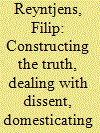

|
|
|
|
|
| Publication |
2011.
|
| Summary/Abstract |
Post-genocide Rwanda has become a 'donor darling', despite being a dictatorship with a dismal human rights record and a source of regional instability. In order to understand international tolerance, this article studies the regime's practices. It analyses the ways in which it dealt with external and internal critical voices, the instruments and strategies it devised to silence them, and its information management. It looks into the way the international community fell prey to the RPF's spin by allowing itself to be manipulated, focusing on Rwanda's decent technocratic governance while ignoring its deeply flawed political governance. This tolerance has allowed the development of a considerable degree of structural violence, thus exposing Rwanda to the risk of renewed violence.
|
|
|
|
|
|
|
|
|
|
|
|
|
|
|
|
| 4 |
ID:
160938
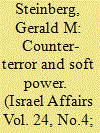

|
|
|
|
|
| Summary/Abstract |
For many years, the network of non-governmental organizations (NGOs) claiming a human rights agenda has consistently sought to delegitimise Israel’s counterterrorism strategy. This phenomenon was prominent during the 2008–2009 and 2014 Gaza wars, when these groups issued hundreds of statements condemning Israel, and in campaigns calling for UN commissions of inquiry (e.g. the Goldstone and Schabas/Davis investigations) into Israeli ‘war crimes’. NGO allegations were also the foundations of lawfare, including efforts to prosecute Israeli officials in the International Criminal Court and other venues, and for BDS campaigns against Israeli and Jewish targets. In this soft-power strategy, the perception of NGO officials as ‘security experts’ provides a major source of legitimacy, lending credence to their reports, despite the lack of credible fact-finding methodologies. Similarly, NGO legal analyses, based on problematic and aspirational interpretations, are accepted and echoed widely, without independent verification. In response, the IDF and Ministry of Defence first ignored and then sought to engage the NGOs in order to persuade them to accept Israeli perceptions and counterterror policies. When these responses failed, the emphasis shifted to countering NGO credibility in legal and diplomatic venues, which has also had limited impact to date.
|
|
|
|
|
|
|
|
|
|
|
|
|
|
|
|
| 5 |
ID:
160633
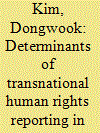

|
|
|
|
|
| Summary/Abstract |
Why do some national governments in East and Southeast Asia receive more transnational scrutiny and pressure on their domestic human rights practices than others? This article argues that transnational human rights reporting is more likely to target states where domestic activists and victims are densely connected with human rights international nongovernmental organizations (INGOs) through a local membership base. Human rights INGOs increase social demands and opportunities for transnational human rights reporting by strengthening local actors’ capabilities to leverage human rights and international solidarity as an advocacy strategy, and by mobilizing them for monitoring and information collection on the ground. Event count analyses of 25 Asian states from 1977 to 2008 find robust support for the theory, using new data on Amnesty International's human rights reporting and human rights INGOs’ local membership base, and controlling for government respect for human rights, regime type, military power, and other factors.
|
|
|
|
|
|
|
|
|
|
|
|
|
|
|
|
| 6 |
ID:
120825


|
|
|
|
|
| Publication |
2013.
|
| Summary/Abstract |
The Ill-Treatment and Torture (ITT) Data Collection Project uses content analysis to measure allegations of government ill-treatment and torture made by Amnesty International (AI) from 1995 to 2005. ITT's country-year (CY) data quantify AI allegations of ill-treatment and torture at the country-year unit of observation and further across different responsible government agents and across different econo-socio-political groups of alleged victims. This paper introduces the Ill-Treatment and Torture country-year data, describes quantitative patterns likely to be of interest to researchers focused on the study of international non-governmental organizations (INGOs) and human rights, and suggests a number of theoretically motivated questions that can be explored using the ITT country-year data.
|
|
|
|
|
|
|
|
|
|
|
|
|
|
|
|
| 7 |
ID:
108214
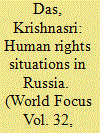

|
|
|
| 8 |
ID:
118086
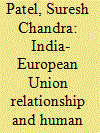

|
|
|
| 9 |
ID:
120867
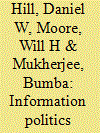

|
|
|
|
|
| Publication |
2013.
|
| Summary/Abstract |
''Information politics'' INGOs such as Amnesty International have incentives to maintain their credibility by carefully vetting information about rights abuses committed by governments. But they are also strategic actors that may inflate allegations of abuse to fulfill organizational imperatives. This raises an intriguing question: When are INGOs more likely to exaggerate their allegations? In answer to this question, we argue that news media reporting pressures INGOs to comment for organizational reasons, even if the information available to them is poor. On the other hand, higher numbers of domestic human rights NGOs increase the quality of available information, and INGOs will find more credible information provided about states as the winning coalition to the selectorate rises. Yet, an incentive to exaggerate allegations under certain conditions does not imply that INGOs will always do so. Indeed, there exists significant observed variation in INGO reports about government abuse. To test our hypotheses, we employ a zero-inflated ordered probit model with correlated errors that permits us to model an unobservable probability (the probability that the INGO exaggerates its allegations) and correct for potential bias. Results provide support for our hypotheses, and suggest that Amnesty International adheres to its credibility criterion, rarely succumbing to incentives to exaggerate abuse.
|
|
|
|
|
|
|
|
|
|
|
|
|
|
|
|
| 10 |
ID:
144912
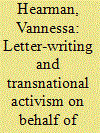

|
|
|
|
|
| Summary/Abstract |
Amnesty International estimated in 1977 that between 600,000 and 750,000 Indonesians had been or were still imprisoned as a result of the Army-led anti-communist violence in Indonesia in the mid-1960s. This article charts the relationship between members of Amnesty International and the Religious Society of Friends (Quakers) with a political prisoner on death row in East Java, Gatot Lestario, a former leader of the Indonesian Communist Party. This article draws on the letters he wrote over a period of three years before his execution in 1985 and interviews with his pen pals. It traces the ways in which he encouraged his pen pals to advocate for human rights in Indonesia and their responses, as well as his own involvement in political prisoner advocacy. This case study illustrates the disappearance of Indonesia's previously close and solidary relationship with the socialist world and its replacement at the people-to-people level with human rights activism involving Western activists. This is particularly evident in the increasingly important role played by members of Amnesty International, the Quakers and other overseas organizations concerned with Indonesia. Finally, the article assesses Gatot Lestario's impact, after his execution, on the development of a long-term advocacy network for Indonesia's political prisoners.
|
|
|
|
|
|
|
|
|
|
|
|
|
|
|
|
| 11 |
ID:
088556
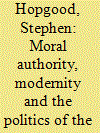

|
|
|
|
|
| Publication |
2009.
|
| Summary/Abstract |
Capitalist modernity's paradox is to erode explicitly the social capital it relies on implicitly to mobilize people to act in concert when they share neither an identity nor an interest. Monetization and rules are the exemplary mechanisms for realizing modernity's aim of commensurability between all social qualities. Simmel helps us see this. But these abstractions create an authority vacuum. The experience of Amnesty International, emblem of modernity, is an example of efforts to overcome this. A close analysis of Amnesty shows that its authority is derived not from Kantian universalism but from a representation of the sacred that serves as a non-modern foundation for modernity. Even as attempts are made to profane this moral authority through commodification and politicization, we can see in the universalization of the Holocaust narrative a renewed effort at creating a singular global memory for humanity as a whole.
|
|
|
|
|
|
|
|
|
|
|
|
|
|
|
|
| 12 |
ID:
090265
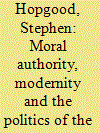

|
|
|
|
|
| Publication |
2009.
|
| Summary/Abstract |
Capitalist modernity's paradox is to erode explicitly the social capital it relies on implicitly to mobilize people to act in concert when they share neither an identity nor an interest. Monetization and rules are the exemplary mechanisms for realizing modernity's aim of commensurability between all social qualities. Simmel helps us see this. But these abstractions create an authority vacuum. The experience of Amnesty International, emblem of modernity, is an example of efforts to overcome this. A close analysis of Amnesty shows that its authority is derived not from Kantian universalism but from a representation of the sacred that serves as a non-modern foundation for modernity. Even as attempts are made to profane this moral authority through commodification and politicization, we can see in the universalization of the Holocaust narrative a renewed effort at creating a singular global memory for humanity as a whole.
|
|
|
|
|
|
|
|
|
|
|
|
|
|
|
|
| 13 |
ID:
144467
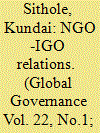

|
|
|
|
|
| Summary/Abstract |
This article draws on the previously unseen archival record to examine Amnesty International's contribution to the abolition of the death penalty in the Council of Europe legal space. The Parliamentary Assembly and the European Court of Human Rights' contributions are widely discussed in scholarly and policy circles alike, but Amnesty International's substantive contribution in the 1970s and in 1989 is less well documented. Political and legal actors in Strasbourg have significant control over the content and timing of international agreements, but in this case Amnesty International was decisive in shifting substantive considerations as to need for regional intervention to prohibit European states from exposing individuals to the death penalty. Of interest to policy students and international relations scholars alike, documenting Amnesty International activity also provides an illustration of nongovernmental actors' contribution to Strasbourg human rights policymaking over time and across a range of political and judicial actors.
|
|
|
|
|
|
|
|
|
|
|
|
|
|
|
|
| 14 |
ID:
185937
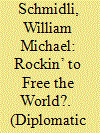

|
|
|
|
|
| Summary/Abstract |
It was the culminating moment in what was billed as the most ambitious music event ever staged. On October 14, 1988, 30,000 exuberant spectators packed the Estadio Mundialista football stadium in Mendoza, Argentina for the penultimate event in the Human Rights Now! concert series, a globe-trotting tour with performances in fifteen countries on four continents. Organized by the human rights organization Amnesty International (AI) to commemorate the fortieth anniversary of the Universal Declaration of Human Rights, the tour showcased some of the most distinguished popular musicians of the era: Bruce Springsteen, Sting, Peter Gabriel, Tracy Chapman, and Youssou N’Dour. Over a six-week period, more than a million people attended concerts, volunteers handed out 1.2 million copies of the Declaration, and hundreds of thousands of concert-goers signed a petition calling upon governments to ratify international human rights treaties and protect human rights advocates.
|
|
|
|
|
|
|
|
|
|
|
|
|
|
|
|
| 15 |
ID:
131069
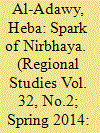

|
|
|
|
|
|
|
|